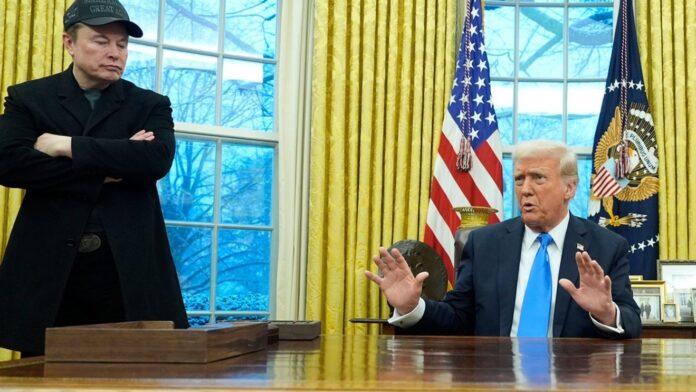On a Tuesday meeting conducted by Zoom, New Mexico’s Attorney-General Raúl Torrez, Kris Mayes of Arizona, and Dana Nessel of Michigan discussed a suit brought forward through 14 states against Elon Musk, DOGE, and Donald Trump. The federal judge’s decision against the TRO came on February 18.
This week it seems the courts have also denied Attorney-General Raúl Torrez of New Mexico and 13 other states a temporary restraining order against Elon Musk, the Department of Government Efficiency, and Donald Trump in federal court.
The lawsuit was announced on Feb. 13. It claimed that specific actions by DOGE — such as contracting millions of dollars through the U.S. Department of Education — were unconstitutional violations of the separation of powers, in addition to violating the U.S. Constitution’s Appointments Clause, which requires congressional oversight of executive positions.
U.S. District Judge Tanya Chutkan, ruling from her findings, said that the plaintiffs “failed to show irreparable harm.” She also noted that considering the thrill the court creates on the plaintiffs, meaning they restrained themselves in requesting injunctive relief from a competing basis to prevent Musk and DOGE from “accessing, copying, or transferring any data systems in the Office of Personnel Management, along with the relevant Departments of Education, Labor, Health and Human Services, Energy, Transportation, and Commerce, and from terminating or otherwise placing on leave employees from those agencies.”
In dismissing the petitions, Chutkan pointed out that while the plaintiffs were unable to demonstrate irreparable harm, they nevertheless “genuinely call into question what appears to be the untrammeled authority of an unelected individual and an entity not created by Congress and over which it exercises no oversight.”
According to Raúl Torrez, New Mexico’s attorney general, in a statement: “While we’re disheartened that the court did not grant our request for a temporary restraining order, we remain steadfastly committed to stopping this unlawful power grab by Elon Musk. Every day that he gets to operate outside congressional authorization, and apparently with little oversight, he’s destabilizing our government and interfering with the very funding for education, public health, and national security. That high-speed disrupt mentality is not only irresponsible but borderline unconstitutional, and we will litigate this case as long as it takes to stop the madness.”
Also read : NAACP Guide: Companies Backing Out of DEI Programs
Surely he gets to advisory?
Joshua Fisher, director of the Office of Administration at the White House, wrote this in a letter to the New Mexico Justice Department: “Mr. Musk should content himself with advising the President and communicating the President’s orders.”
The multi-state coalition is suing to nullify all of the prior work undertaken by the billionaire Trump ally, putting the existence of DOGE, at least in its current state, in jeopardy.
The states have narrowed the immediate request for a temporary restraining order down to seven agencies-the Office of Personnel Management, the Departments of Education, Labor, Health and Human Services, Energy, Transportation, and Commerce-and written to Chutkan on the topic will also focus on records access and personnel moves since she expressed concern over the scope of their original request.
On Monday, Judge Chutkan sought clarification from New Mexico Justice Department attorney Anjana Samant regarding what they had to support their claim of how and when Musk and his team were accessing the records from these agencies or moving to fire or place federal workers on leave, and how that would irreparably injure the states in ways they couldn’t remedy in a matter of weeks or months.
She said that she could not rely solely on the media reports while admitting that Musk’s speed had made it very difficult for the plaintiffs to meet the standard of showing “concrete harm”.
Also read: FAA Layoffs Spark Safety Concerns Amid Staff Shortages
Moving very fast
“Some of the difficulties we face revolve around that DOGE seems to function in an utterly unpredictable and disorderly way, and what would be understandable in those cases where the plaintiffs find themselves scrambling for knowledge about what is next,” she said. “I really wouldn’t know if that’s deliberate or not.”
Samant pointed out Musk’s social media posts and public comments about the agencies that DOGE was investigating or incentivizing. She noted that the states relied on both federal funds and U.S. government employees to provide guidance.








